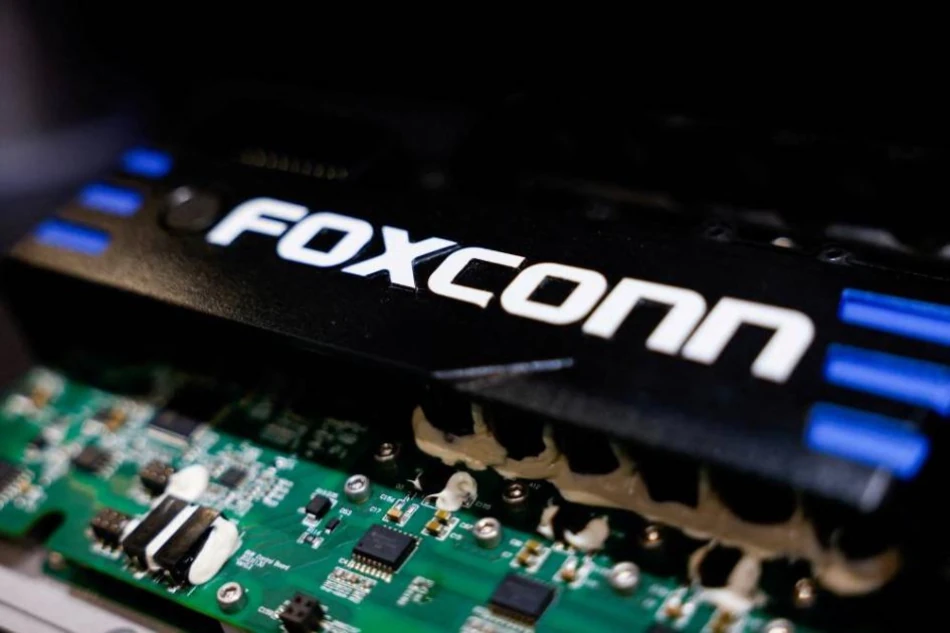
Foxconn's AI-Powered Surge: Profits Reach $1.5 Billion
Foxconn's AI Server Boom Drives 27% Profit Surge, Reshaping Taiwan's Tech Manufacturing Future
Taiwan's Foxconn posted a stellar second quarter with net profits hitting $1.5 billion, powered by explosive growth in artificial intelligence server manufacturing. The world's largest contract electronics manufacturer is successfully pivoting from its iPhone assembly dominance to capture the AI infrastructure goldmine, though looming U.S. trade tensions could test this transformation.
Record-Breaking Quarter Fueled by AI Infrastructure Demand
Foxconn's operating profits jumped 27% year-over-year to $1.89 billion (56.6 billion Taiwan dollars), surpassing London Stock Exchange analyst estimates. Revenue reached $59.8 billion (1.79 trillion Taiwan dollars), meeting market expectations and demonstrating the company's ability to capitalize on the AI boom sweeping global tech markets.
The standout performance reflects a broader shift in global manufacturing priorities, where AI infrastructure has become as critical as consumer electronics. Foxconn's success mirrors the supply chain realignment happening across Asia, where traditional electronics manufacturers are racing to capture AI-related revenue streams.
Strategic Pivot: From iPhone Assembly to AI Server Manufacturing
Foxconn has strategically positioned itself as a key player in AI hardware manufacturing, designing specialized server racks tailored for artificial intelligence workloads. This move represents a calculated diversification from its heavy reliance on Apple's iPhone production, which has faced cyclical demand pressures in recent years.
The company's partnership with Nvidia, the dominant AI chip manufacturer, has proven particularly lucrative. This alliance positions Foxconn at the center of the AI infrastructure supply chain, similar to how its Apple relationship defined its consumer electronics dominance over the past decade.
Explosive AI Revenue Growth Projected
Foxconn forecasts its AI server business will grow by more than 170% year-over-year in the current quarter. This projection, if realized, would cement the company's transformation from a pure contract manufacturer to a specialized AI infrastructure provider.
The growth trajectory aligns with global AI infrastructure spending, which research firms estimate will exceed $100 billion annually by 2025. Foxconn's early positioning in this market could generate sustained revenue growth beyond traditional electronics manufacturing cycles.
Trade War Challenges: Navigating U.S. Tariff Pressures
Despite strong AI-driven growth, Foxconn faces significant headwinds from U.S. trade policies under President Donald Trump's administration. Global tariffs pose a direct threat to the company's manufacturing model, which relies on cost-efficient production and seamless international supply chains.
In response to these pressures, Foxconn has already relocated most iPhone production destined for the U.S. market to India. This geographic diversification strategy mirrors moves by other major manufacturers like Samsung and reflects a broader "de-risking" trend in global supply chains.
India Manufacturing: A Strategic Hedge
Foxconn's India expansion represents more than tariff avoidance—it's a long-term bet on South Asia's manufacturing potential. The shift aligns with India's "Make in India" initiative and provides Foxconn with a lower-cost production base outside China's sphere of influence.
This diversification strategy positions Foxconn similarly to how Dubai and Singapore have become regional manufacturing hubs—offering political stability and favorable trade relationships with multiple global markets.
Market Implications: What This Means for Investors and Competitors
Foxconn's successful AI pivot signals broader opportunities for contract manufacturers willing to invest in specialized capabilities. The company's performance suggests that AI infrastructure demand is not just a temporary boom but a sustained shift in technology spending priorities.
For investors, Foxconn's results indicate that companies positioned at the intersection of AI hardware and manufacturing efficiency could outperform traditional electronics manufacturers. The 170% AI revenue growth projection, if sustained, could justify premium valuations for AI-focused manufacturing plays.
Competitors like Pegatron and Quanta Computer will likely accelerate their own AI infrastructure investments to capture similar growth opportunities. This competitive dynamic could drive innovation and efficiency improvements across Taiwan's manufacturing ecosystem.
Looking Forward: Sustainable Growth or Cyclical Peak?
Foxconn's AI server success raises questions about sustainability. Unlike consumer electronics, which follow predictable upgrade cycles, AI infrastructure demand depends on continued enterprise adoption and technological advancement. The company's ability to maintain 170% growth rates will depend on whether AI deployment accelerates or plateaus.
The geographic diversification to India, while strategically sound, introduces execution risks. Manufacturing complex AI servers requires sophisticated supply chains and technical expertise that may take time to develop outside Taiwan's established ecosystem.
Nevertheless, Foxconn's strong Q2 performance demonstrates that traditional manufacturers can successfully adapt to emerging technology trends. The company's transformation from iPhone assembler to AI infrastructure provider offers a blueprint for how established manufacturers can capture value in rapidly evolving tech markets.
Most Viewed News

 Omar Rahman
Omar Rahman






